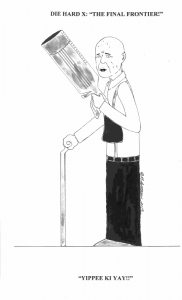Debora Lima/Contributing Writer
No longer a date night staple, a trip to the movie theater has become a vehicle for an encounter with the most offensive of déjà vu sensations. Over the aroma of buttery popcorn, audiences can practically smell desperation coming from the preview for the remake of “RoboCop.” Or maybe the stench is because of the trailer for “A Good Day to Die Hard,” or as I call it, “Bruce Willis Is Covered in Sweat and Blood 5.”
I can’t be the only one thinking, “Phew! Good thing there is a fifth installment, the first four movies left so many unanswered questions.”
Have all waiters and bartenders in Los Angeles given up on screenwriting? The scarcity of original films suggests that this may be so.
According to The Economist, the five studios controlled by major media conglomerates have been hit with a 40 percent pre-tax profit decline between 2007 and 2011. Paradoxically, technology has not lowered film production costs as predicted but increased them instead. The switch from analogue to digital film allows directors to be obsessively meticulous by shooting more and consequently, using up costly production and editing time.
Television, on the other hand, is absolutely thriving. It is a hit with both audiences and critics. There is enormous pressure on the film industry to defy analysts who predict “revenue from American cinema will be flat for the foreseeable future.”
Studios have reacted to volatile film earnings by employing a pathetic formula for potential box office success: prequels, sequels and remakes. I am as drawn to nostalgia as the next person but I am nonetheless capable of discerning between a fresh take on a familiar story and a steaming pile of uninspired Hollywood excrement.
An example of new eyes on an old story would be Tim Burton’s “Charlie & the Chocolate Factory.” Gene Wilder is the ultimate creep with his manic gaze, and even dentures and a bob haircut could not elevate Johnny Depp to such “creeperdom”, but Burton’s adaptation of Willy Wonka’s sugar coated world preserved the original film’s blend of lunacy and whimsy.
The excrement category would be well-represented by Gus Van Sant’s “Psycho.” Talk about unnecessary. What’s the saying again? “If it ain’t broke, don’t fix it. And if you’re not Alfred Hitchcock, back off,” or something along those lines.
Woody Allen established himself as an industry anomaly through his rapid rate of production and is proof that brilliant ideas do not simply go extinct. Some would argue Allen’s work has diminished in quality over the years but this assertion is offered by those looking at reality with a distorted perception. Allen will never make another “Annie Hall” or another “Manhattan” and he shouldn’t have to. “Midnight In Paris,” for instance, was great in its own right and remarkably, not a sequel, prequel, or a remake of any of his hits of yesteryear. This leads me to ask studio executives: why not leave well enough alone and dare to be original instead?
All movies will not be a Quentin Tarantino-esque masterpiece or Stanley Kubrick mind-bender but I’m certain I speak for many when I say enough with the “Paranormal Activity” franchise and “Fast and Furious” movies. Most of us have IQs higher than 70, in spite what Honey Boo Boo’s ratings suggest, Hollywood; create accordingly or bear the consequences.






